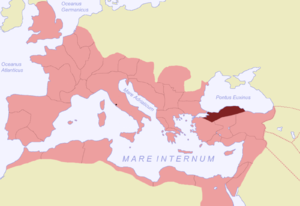Christians around AD 110
Early Christianity was prevailing in Asia Minor.
Pliny the Younger, governor of Bithynia-Pontus from c. 110-112, wrote a series of letters to Roman Emperor Trajan, one of which asked for council on dealing with Christians. The letter (Epistulae X.96) details an account of how Pliny conducted trials (cognitio extra ordinem or the process where the magistrate was not only a judge but active in the investigation and examination of evidence) of Christians brought before him by private accusations.http://en.wikipedia.org/wiki/Pliny_the_Younger_on_Christians
http://it.wikipedia.org/wiki/Bitinia_e_Ponto
How early Christians were observed by the Roman elite can be understood letters Pliny the Younger wrote to the emperor.
Pliny then details the practices of Christians: he says that they meet on a certain day before light where they gather and sing hymns to Christ as God. They take various oaths not to do any crimes such as fraud, theft, or adultery, and then dine together. However, Pliny says, all of these practices were abandoned by the Christians after Pliny forbade any political associations (hetaerias or “club”). These clubs were banned because Trajan saw them as a “natural breeding ground for grumbling” about both civic life and political affairs. One such instance of a banned club was a firemen’s association; likewise, Christianity was seen as a political association that could be potential harmful to the empire.[10] However the Christians seem to have willingly complied with the edict and halted their practices. Pliny ends the letter by saying that Christianity has spread not only through the cities, but also through the rural villages as well (neque tantum...sed etiam), but that is will be possible to check it....Accordingly these letters can be pieces of evidence for existence of Christ Jesus as a man in history.
Pliny the Younger's letters are rare descriptions of Roman administrative process and problems. Pliny's letter describing the Christians allows modern scholars to accurately conceive of the Christian experience in Rome. They are some of the few non-Christian sources about the legal status and treatment of Christians. The correspondence between Pliny and Emperor Trajan describes that the Roman Empire, as a government entity, did not encourage the pursuit or “seek[ing] out” of Christians. Although Emperor Trajan gave Pliny specific advice about disregarding anonymous accusations, for example, he was deliberate in not establishing any new rules in regards to the Christians. In doing so, Trajan allowed Pliny to try cases as according to his discretion and to the social demands of his province. This purposeful lack of specificity demonstrates the delicate and nuanced professional relationships between the Emperor and his governors.
Additionally, Pliny's letter also allows scholars to date the Christian pogroms in the Eastern provinces. Pliny specifically says in his letter that he cannot find anything to answer his question on the Christians in any constitutiones of previous Emperors[2]. Given that Pliny wrote his letter to the Emperor because he was unsure of any previous legal precedent implies that there was not a systematic Roman persecution of the Christians prior to the letters. The letters also serve as evidence for the historical Jesus Christ. It supports the existence of the early Christian Church and speaks to its belief system.So, 1900 years later, Christianity has prevailed all over the world, since so many courageous believers practiced and kept their faith in Christ as God. But who carried out the mission to diffuse words of the Christ as far as the Black Sea area 70 years after the death of Christ Jesus?
*** *** *** ***
Joh 6:15 When Jesus therefore perceived that they would come and take him by force, to make him a king, he departed again into a mountain himself alone.


